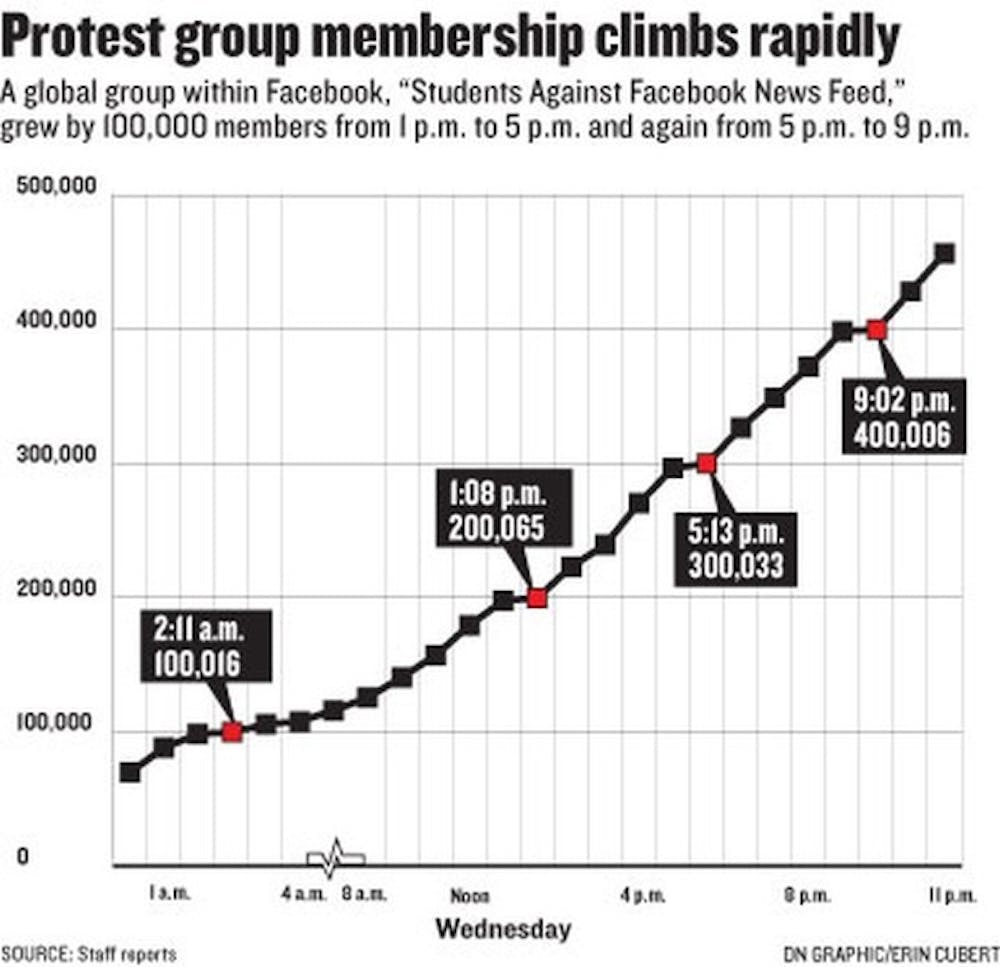UPDATE: [10:13 p.m. EST, Thursday] The "Students Against Facebook News Feed" protest group crossed the 700,000 member mark at 9:37 p.m. Thursday.
Coming next week to the DN: A look at the sociological affect of social networking sites on this generation's college students.
---
The walls holding up users' sense of security came crumbling down Tuesday when Facebook introduced News Feed and Mini-Feed.
Previously users had to view friend's profiles individually, but the feeds collect social network information and display it immediately on students' Facebook home pages. This made students think about the privacy issues involved with using the online social networking Web site.
The News Feed is a listing displayed on the user's home page and shows what friends in their network have been doing, such as when someone changes relationship status, adds new friends or joins a group.
"I think it takes the fun out of exploring," Ball State University senior Mary Sample said of the change.
Fred Stutzman, a doctoral student at the University of North Carolina at Chapel Hill, said the Facebook changes take the notion of living publicly to a new level.
"There's sort of a reality that even though we share everything, we actually don't want it to be seen by everyone around us," said Stutzman, who has researched social networking sites.
With the changes Facebook made, people's social lives are updated and viewed by the second. That on-demand fever makes some students uncomfortable.
"It's a generation of people acclimated to online social networking suddenly waking up to the repercussions of that activity," said Sarah Robbins, a doctoral student in rhetoric and composition and an internet identity researcher.
"They feel a loss of control in Facebook, which I think students feel a sense of ownership," she said in an online chat Wednesday.
Most people use Facebook by viewing only a few friends' pages a day and do not want to know what's going on with all of their friends all the time, Stutzman said. There is an assumption by students that when they change something only a few people will see it, he said. That changed with News Feed.
"All of a sudden you realize everything you do is actually going to be seen by everyone you know," Stutzman said.
Ball State students used words like stalker-ish, weird and ridiculous to describe the changes.
"It's a little overbearing," freshman Ryan Rader said. "It's unwanted."
Across the country, people protested by creating anti-Facebook News Feed groups on the Web site. Many students found out about these groups because they saw friends joining the same groups on the News Feed.
"The very power to protest is given by the same technology they are protesting," Robbins said.
The Facebook group "Students against Facebook News Feed" grew exponentially since the changes were made. Between 1 p.m. and 5 p.m. Wednesday, more than 100,000 students joined, putting membership at 300,000. At press time, the group had a total of 508,849.
Mark Zuckerberg, Facebook founder and CEO, said the Web site's management was listening to suggestions about the social network.
"We're not oblivious of the Facebook groups popping up about this," he said in a blog on the Web site. "And we agree, stalking isn't cool; but being able to know what's going on in your friends' lives is."
Online conversation bustled Wednesday in blogs and online news sites. Blog posts involving the term Facebook spiked Tuesday, with Technorati, a blog tracking Web site, reporting more than 900 posts, up from Monday's count of fewer than 400.
Amid all the blog posts rose questions of Facebook's ultimate goal.
Stutzman said the Facebook change is targeted at getting people to view more pages on the Web site, which attracts advertisers. The constant stream of information on the user's home page is designed to generate clicks to other pages and profiles, Stutzman said.
"When a business does something like this, they're doing it for the bottom line," he said.
Researchers insist Facebook will survive regardless of the negative response some students have about the latest changes.
"It's a period of maturation," Robbins said. "We have to learn to use the tools, not ditch the tools."
LINKS:
Click here to see the Online Facebook Petition
Post Your Comments to the DN Facebook Message Board



